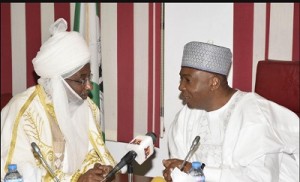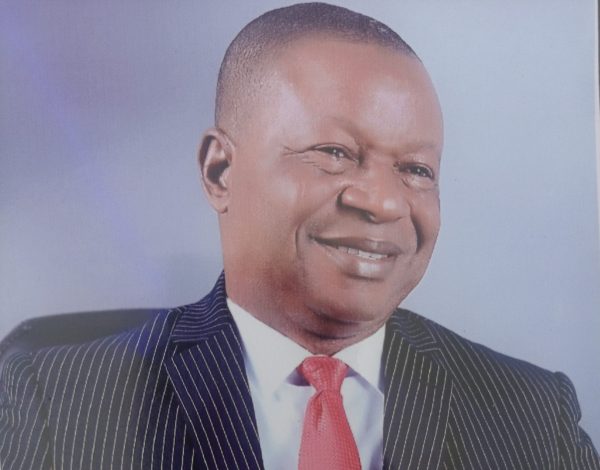ACCESS BANK: Banking On Saraki’s, Sanusi’s Conspiracy

Contrary to his public image as a no-nonsense Governor of the Central Bank of Nigeria (CBN) and a reformer who always pride himself as an anti-special interest, Sanusi Lamido Sanusi’s complicity in the questionable acquisition of Intercontinental Bank by Access Bank and the God-Father role of Dr, Bukola Saraki showed the true Sanusi Lamido Sanusi. Africa Inquirer reports, how the former Governor of Central Bank- Sanusi Lamido and Dr, Bukola Saraki masterminded the biggest bank fraud in Nigeria’s banking industry history.
In 2009 when Prof. Chukwuma Soludo’s appointment was due for renewal as the Governor of Central Bank, late President Umaru Yar’Adua was misled by the cabal that eventually hijacked his government into refusing Prof. Soludo’s a second term and instead, appointed Sanusi Lamido as Soludo’s successor. Prior to his appointment as the Governor of CBN, Soludo had joined the government of former President Olusegun Obasanjo in 2003 and served as the Chief Economic Adviser and Chief Executive of the National Planning Commission of Nigeria .
So in June 2009, Sanusi Lamido became Governor of Central Bank. Barely two weeks in office, in an unusual move, Lamido dispatched CBN examiners to five banks- AfriBank, FinBank, Intercontinental Bank, Oceanic Bank and Union Bank. A CBN source disclosed to Africa Inquirer that the inclusion of Intercontinental Bank was a surprise because the CBN had just concluded a comprehensive examination of the bank and gave it a clean bill. In a surprise twist of event, CBN examiners changed their positive report on Intercontinental Bank to “non-performing.” Our source at the CBN disclosed that Mallam Lamido rejected the favorable report presented to him, hence the re-classification of the report from “performing to non-performing.” As at this time, Intercontinental Bank was one of the biggest and the largest bank with a balance sheet size of about N1.7 Trillion.
Our investigation reveal that the late Yar’Adua’s refusal to renew Soludo’s appointment was actually influenced by Dr. Bukola Saraki, using his political weight as the then Chairman, Governors’ Forum. It was “Saraki who pressed for the replacement of Soludo with Lamido,” our source disclosed. Why would Saraki want Lamido? What is Saraki’s interest in Lamido and what connects the two men? Africa Inquirer diggings reveal that Mallam Lamido and Bukola Saraki have been childhood friends. The two went to same High School, King’s College, Lagos with their mutual lawyer, Kola Awodein. While Lamido graduated in 1977, Bukola Saraki left King’s College in 1978. Besides being school mates, Saraki and Lamido are Erastus Akingbola’s mutual enemies by their own creation. Before the emergence of Sanusi Lamido as the Governor of CBN, Dr. Bukola Saraki had taken a loan from Intercontinental Bank to the tune of N11Billion.
Our investigations reveal that through Joy Petroleum, as a parent company, Saraki used four other companies namely: Sky view Properties Ltd, Limkers Ltd, Dicetrade Ltd, Carlisle Properties and Investment Ltd, while Dr. Bukola Saraki was portrayed by the bank documents as the Prime Promoter of all the companies including Joy Petroleum Ltd. Under Erastus Akingbola, Saraki secured the 11 Billion Naira loan with four houses in Ikoyi and in Abuja. The houses are on 19 Ruxton road, Ikoyi; 15A MacDonald Road, Ikoyi; 17 MacDonald Road,Ikoyi and Plot 2481 Cadastral Zone A06 Maitama, Abuja.
As soon as Lamido became the CBN governor, and with the doctored report of ‘non-performance” of Intercontinental Bank which was never released to the public till date, Lamido fired the CEOs of the five banks, including Akingbola and appointed acting Managing Directors. Mr. Lai Mahmoud Alabi, a former staff of Bukola Saraki was appointed by Lamido as the Acting MD of Intercontinental Bank. Lai Alabi served as Bukola Saraki’s Chairman of Songa Farms and several development funds in Kwara State.
Lai Alabi’s first task as the new head of Intercontinental Bank was to summon the board of directors to write off N 8.1 Billion out of the N11 Billion owed by Saraki and which were surprisingly, well collateralized with choice assets in Ikoyi, this write-off was strongly condemned by the CBN examination report of May 2010 which complained about the massive loan forgiveness, calling it “cash gift.” The examiners also questioned the rationale behind the return of the collaterals to Saraki. Yet, Mr Lamido never acted since he was only satisfying his benefactor.
Curiously, before Lamido’s takeover of Intercontinental Bank, the bank’s inter-bank takings was N73 Billion, with no record of the bank’s indebtedness to the CBN but by the time the bank was sold, it was owing the CBN N100 Billion and other banks N300 Billion. Contrary to Lamido’s claim that he injected N100 Billion to revive Intercontinental Bank, the bank’s balance sheet as at the time of takeover was N1.6 Trillion. The bank had 330 branches, 2 foreign subsidiaries, 12,000 employees and paid-up capital of N230 Billion.
If the takeover of Intercontinental Bank and the replacement of its employees by former employees of defunct Societe Generale Bank were not surprising enough, the sale of the bank to Access Bank was the most fraudulent in Nigeria’s banking industry history.
In 2011, Aig Imokhuede, founder of Access Bank and a debtor of Intercontinental Bank began talks with the Sanusi Lamido-led Central Bank of Nigeria to acquire Intercontinental Bank Plc. Further to the approval of the shareholders of Intercontinental Bank and Access Bank, court sanction of the Federal High Court of Nigeria and approval of the Central Bank of Nigeria and the Securities & Exchange Commission, Access Bank Plc (“Access”) and Intercontinental Bank Plc (“Intercontinental Bank”) announced the completion of the recapitalization of Intercontinental Bank and the acquisition of 75% majority interest in Intercontinental Bank by Access Bank Plc.
In effect, Intercontinental Bank (including all its assets, liabilities and undertakings) became a subsidiary of Access Bank Plc. Aluko & Oyebode acted as Transaction Counsel to Access Bank Plc in connection with its acquisition of Intercontinental Bank Plc. The question is: How did Aig Imokhuede and Herbert Wigwe acquired Intercontinental Bank?
Africa Inquirer obtained a loan document showing how Aig Imokhuede and his partner, Herbert Wigwe (current MD Access Bank) used a company called United Alliance Company of Nigeria to borrow over N16 billion from Intercontinental Bank under Akingbola. The duo tactically delayed payment of the loan. Aig wrote to Mr Lai Alabi twice rescheduling the payment of the loan which were allegedly written off by the CBN before the forced controversial acquisition of the bank by Access Bank.
Our investigation later discovered that, the delay tactics was part of the plan of Saraki and Lamido to sell Intercontinental Bank to Aig Imokhuede who took loan from Akingbola’s bank to acquire Access Bank. Lamido’s CBN used Asset Management Company of Nigeria (AMCON) to deplete Intercontinental Bank’s assets before selling it to Access Bank. Since Access Bank is owing Intercontinental Bank N16 Billion, where did it get the N50 Billion to purchase Intercontinental Bank? Africa Inquirer discovered that Aig Imokhuede, sourced for the N50 Billion from Bank of Industry.
As at this time, the Managing Director of Bank of Industry was Mrs. Evelyn Oputu, Aig Imokhuede’s mother-in-law. With impunity, under the supervision of Malam Lamido as the CBN Governor, N50 billion was paid to Intercontinental Bank account in the evening, and immediately after the acquisition of Intercontinental Bank was announced, Aig Imokhuede, transferred the N50 Billion back to the Bank of Industry. By implication, Aig and his group paid nothing for Intercontinental Bank. Mrs. Oputu is being investigated by the Financial Reporting Council for alleged fraudulent practices as the Managing Director of the Bank of Industry.







